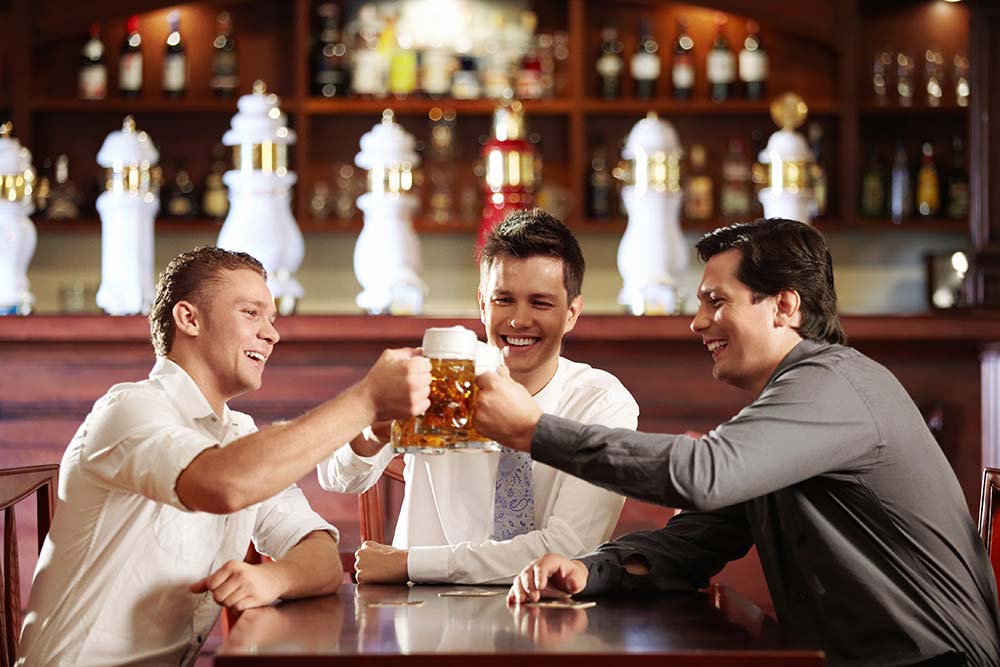Do People Actually Tell the Truth When Drunk?

Anyone who has spent any time at all around a heavy drinker will know that when alcohol starts pouring, secrets come out. This is true for both occasional binge drinkers and long-term substance abusers; alcohol makes many people more open about their feelings, more likely to talk about anything, and more likely to say hurtful and mean things. But, does it necessarily mean that whoever you're talking to is telling the truth just because they're drunk?
While alcohol can certainly cause people to reveal truths that they wouldn’t otherwise share, especially personal information, also known as oversharing, there's a lot of science that goes into exactly what is said and why. More importantly, alcohol isn't a truth serum, and while people can be more open when drunk, there are a lot of factors going into whether what they are saying is true or not.
Alcohol and Self-Regulatory Control of Behavior
When someone drinks alcohol, you'll likely notice that they become less inhibited. Someone who is drinking is more likely to shout, run, dance, sing, or do any of a number of things that they would likely never think about or at the least do more cautiously, when sober. At the same time, alcohol causes motor control loss, so that those same activities become less controlled and graceful, something that the person might even be embarrassed to see themselves doing. But, why do they do it?
This effect is known as impairment of evaluative cognitive control, where neurotransmitters and electrical signals in the brain slow down or even stop in some cases. In one study, it was shown that the largest influencing factor behind lowered inhibition when drinking is a reduction in Negative Affect, or memories and emotions relating certain behavior to negative effects such as stress, embarrassment, or pain. A person with inhibited negative affect isn't associating anything they say with a possible negative outcome, they're just saying it.
Alcohol Inhibits the Brain's Emotional Processing
Several studies have shown that alcohol inhibits neurotransmitters and signals inside the brain, including those responsible for communicating emotional and social processing. What this means is that a person who is severely under the influence, especially those who frequently binge drink, have more difficulty telling emotions apart, are less good at picking up social ques, and less able to process their own emotions.
So, a frequent drinker may experience a strong emotion such as anger or grief or lust and it can seem to hit harder than it would when they are sober. This can explain why people are often more emotional when drunk, especially in tandem with lowered inhibitions.
Effects Worsen with More Alcohol
In one study, a group of light and heavy drinkers were paired to tackle Go/No Go tasks (should they do the task based on moral/safety/legal issues). Here, light drinkers showed moderate impairment to inhibition but no other effects while heavy drinkers showed impairment to inhibition and to working memory. The study hypothesized that while light drinkers use working memory to rationalize decision making, heavy drinkers must do so much more often, overloading working memory so that they are no longer able to use good judgement for a number of things that would normally be very easy when sober.
It also affects a process known as social rationalization, which sober people use to determine if something is socially acceptable to say (for example, you'd probably know not to use racial pejoratives or slurs, but a drunk person doesn’t always make that distinction, even when they don’t use slurs or seem bigoted while sober).
This effect shows why a person who is somewhat drunk will likely still be able to make good decisions, may easily distinguish between things they can and cannot do, and will be able to rationalize when something goes wrong, where a very drunk person or a very frequent drinker cannot.
Why Do People Talk So Much When Drunk?
Alcohol strongly affects the inhibitory processes relating to social behavior. In one study, persons who consumed a moderate amount of alcohol showed primary inhibitory impairment surrounding social actions, or those resulting in attention, but not in other forms of inhibition. This hypothesis suggests that most inhibitory affects surround social activities, especially those involving having fun with others (more drinking), dancing or sex, talking to family and loved ones (even exes), and using more substances to continue to feel good.
Inhibitions are often less involved when it comes to singular activities. Therefore, people who are drinking on their own and without a phone are not as likely to exhibit reckless behavior or to be involved in activities that are traditionally associated with drinking (reckless driving, dancing, yelling, fighting, etc.) because inhibition is not lowered in non-social respects.
So, Is Something a Drunk Person Says Necessarily True?
Science tell us a lot about how and why alcohol affects the brain. For example, lowered inhibitions make a person more likely to say what's on their mind. And with lowered social rationalization, they are less able to stop themselves if they haven't said something in the past because they are afraid of what you might think or how you might feel. This is why many people talk very openly about things that are important to them or about secrets when they are drunk. In combination with the social factor of increased attention seeking, where many people tell you things to show off or to keep your attention, and drunks often over share or share personal and insightful information.
However, it doesn't necessarily have to be true.
Inhibited emotional processing means that a person is more likely to respond emotionally. If a person is very drunk and feels that they are being attacked or hurt, they are likely to respond extremely aggressively. This can include blatant lying as the brain uses anything it can as a defense mechanism. This is especially true for addicted individuals who are in self-denial, because they are in a state where they can easily grasp at anything and tell a half-truth to defend themselves. So, if someone is saying something that seems to exonerate them or put the blame on someone else, or even suggests that they aren't drinking much, it's likely a blatant falsehood.
How can you tell the difference? Sometimes, context matters. Very drunk people often don't have the rationalization skills to be manipulative, so positive emotions and heartfelt conversations are often genuine. If they're speaking and they're angry or defending themselves, it could go either way.
Getting Help
If someone in your life is drinking enough that they are frequently cognitively impaired by alcohol, they have a problem. You likely already know that, and if they aren't deluding themselves, they do as well. Having a heart to heart conversation with a loved one who is abusing alcohol can help them to get into rehab where they can get help and get better.
Long-term alcohol use causes significant damage to the brain and body, some of which can be permanent. It negatively affects finances, causes health problems, increases the risk of criminal behavior such as car accidents or driving while drunk, and can cause emotional withdrawal, anxiety, and even depression.
Getting your loved one into rehab will enable them to detox in a safe, medically supported facility. Once sober, your loved one can begin to integrate into therapy, getting treatment, evaluation for underlying causes of addiction, and cognitive behavioral therapy to teach positive and healthy coping mechanisms for stress and triggers. More importantly, they can learn to live a happy and fulfilling life without alcohol. If you or your loved one needs more information please feel free to contact Anaheim Lighthouse, a modern and effective addiction treatment center in Southern California, we’re here to help.














